I don’t know about the rest of the Pat Metheny fan base, but I was pretty much unprepared for what the opening title track of As Falls Wichita, So Falls Wichita Falls had to offer. More than 20 minutes of musical narrative that sounded like no other recording in my early record collection. It wasn’t quite jazz, though it also wasn’t unstructured enough to be a film score.
Even way back then, I thought of its opening side as a kind of journey, though not necessarily a physical one. A person might be thinking of a particular time in their life as As Falls Wichita, So Falls Wichita Falls begins: things they’d done and places visited. And while that story tumbled out, so did the music. There are musical climaxes that carry a great deal of emotion, adding to the pensive feel.
My favorite part of the composition comes about a third of the way in, when a drum machine pattern is set against a talking drum. I don’t know if it was intended, but that’s always sounded like a conversation to me — and not exactly a relaxed one either.
Toward the end, as Lyle Mays’ synth washes rise and rise, I see everything dissolving to bright white. Does the journey have a happy ending? I have no idea.
Unlike a lot of American kids, I was not forced into taking piano lessons. I was more of a stringed instruments guy, first with the violin and then the guitar. But there are times when I wish I knew how to play — like every time I hear “Ozark,” released as part of As Falls Wichita, So Falls Wichita Falls in May 1981.
Now here is one of my favorite Lyle Mays vehicles. That driving, uptempo piano riff is one of the most ecstatic things he’s ever recorded. It induces (in addition to the desire to play piano) memories of the last day of school — with the whole summer stretching out before me … pure joy.
Check out this live version from 1982. They stretch the piece out a little, and you get to see the wizardry of Nana Vasconcelos with the berimbau.
In interviews, I’ve seen Mays speak of how music has it’s own “language and syntax.” He wasn’t necessarily talking about music’s technicalities — harmony, melody, and the like. Instead, it was those ideas that can only be expressed through music. Now, I’ll grant you that it’s very difficult to describe this phenomenon, but maybe that’s the point.
“September Fifteenth,” the unspeakably beautiful tribute to pianist Bill Evans from As Falls Wichita, So Falls Wichita Falls, always makes me think of Mays’ ideas of musical meta-language. Does knowing the composition’s intent somehow get in the way of a listener’s understanding – as some say analysis of a poem might do? I don’t think so.
Early on, Pat Metheny is playing the acoustic guitar inside of Mays’ pastoral synth washes. I’ve always been struck by the changeover, when Pat rides on four chords, introducing Lyle’s short melody on the Oberheim. After that, Lyle switches to piano and the pair are locked in for a time. The interplay is both delicate and intimate – exactly what Bill Evans’ career was built on. But when Metheny steps back for Lyle Mays’ solo passage? Incredible.
I’ve seen them play this live a few times and it’s always stunning.
While I do tend to think of music in terms of albums, there are certain songs that for a variety of reasons get pulled away from their original context. In my mind, “It’s For You” no longer lives with the rest of the As Falls Wichita, So Falls Wichita Falls album. In 1985, it was used to great effect in the film Fandango.
If you’ve never seen the movie, it’s one of those truly American coming of age/road trip things, starring both Kevin Costner and Judd Nelson. It’s full of the usual road trip hijinx and becomes something of a mess midway through. The first time I showed this one to TheWife™, I turned to her at one point and assured her that “All of this is going to come together.”
And come together it does. Without going into too much about the plot, let’s just say that the right people get together in the end, culminating is one of the most touching wedding scenes I’ve ever witnessed. You’ll see in the video embedded above. When Nana Vasconcelos sings those descending notes, you just know everything’s going to turn out alright.
“Estupenda Graca” is a rare entry in the Pat Metheny catalog in that the title, Portuguese for “Stupendous Grace,” actually matches the mood of the song. With Metheny and Lyle Mays providing a series of gently unfolding arpeggios, Nana Vasconcelos sings a lovely meditation. At under three minutes long, the song feels like a lullaby. I never get tired of Vasconcelos voice, wordlessly imparting so much emotion.
As the conclusion to As Falls Wichita, So Falls Wichita Falls, I’ve often gotten the feeling that “Estupenda Graca” was being sung back to rest of the album, one piece of music communicating with its neighbors.
- Why the Rolling Stones’ Harrowing ‘Gimme Shelter’ is Still Revealing New Depths - November 18, 2024
- How Talking Heads’ ‘Fear of Music’ Opened Up a World of Art and Sound - August 5, 2024
- How Deep Cuts Propelled Bruce Springsteen’s ‘Born in the U.S.A.’ - June 4, 2024





I first heard “Wichita” from the live album Travels where, in my opinion, the finale almost explodes at you like a musical orgasm with the audience’s applause adding icing to the cake. Still leaves me drained.
Same here – for me the Travels version is the one that ‘lives in my head’. But I absolutely adore the entire album and feel it is underappreciated in the catalog of these two artists.
Great review of an equally great Metheny/Mays album. By the way, Estupenda Graca is based on a motif from Amazing Grace, hence the title.
Thank you for the beautiful essay on this album. My first boyfriend introduced this to me when we were 20 years old, in 1982. Where is he now? I don’t know, but he somehow lives on in my heart every time I play this music. I am thankful he introduced it to me, for I was heading along a much different musical road before I heard this. Pat Matheny and Lyles Mays: I am glad to have been on this human journey at the same time you were creating and playing your music.